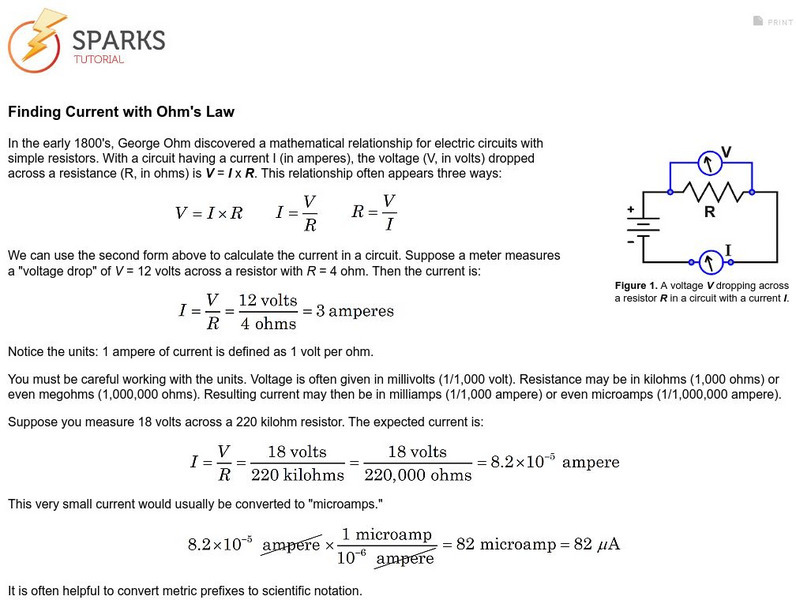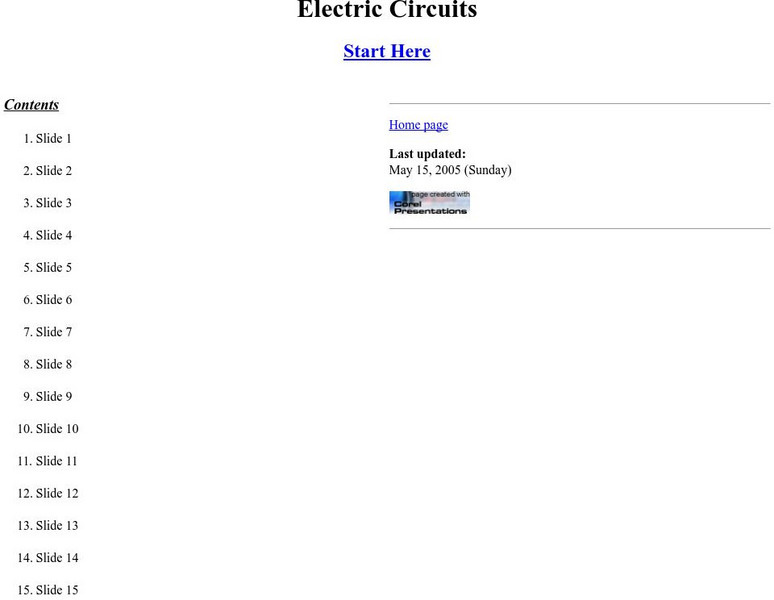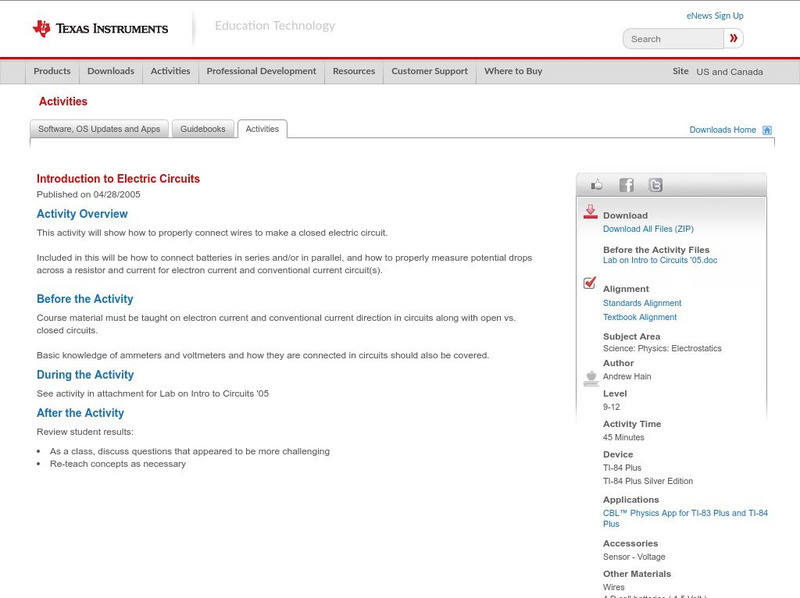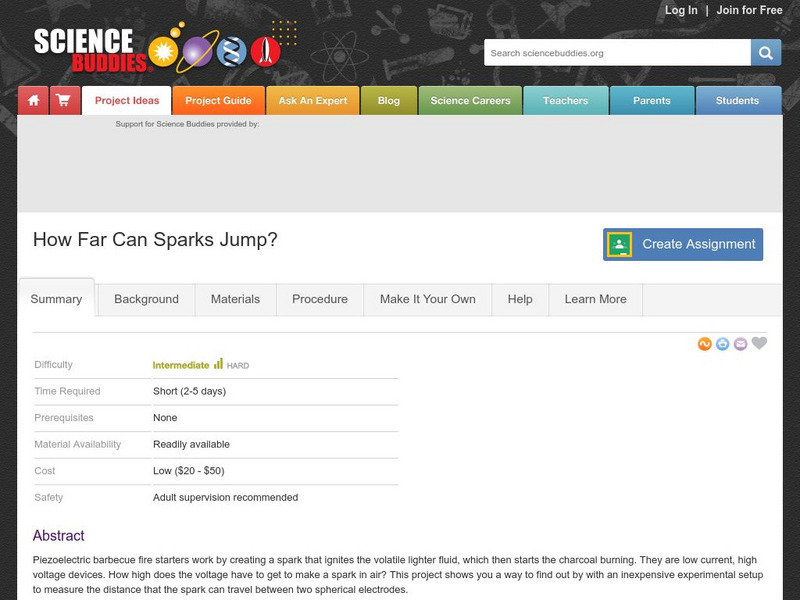Other
Beginner's Guide to Measurement in Electronic and Electrical Engineering [Pdf]
The National Physical Laboratory, which is the UK's National Measurement Institute, offers a Beginner's Guide to Measurements in Electronics and Electrical Engineering. Discusses how electric currents are measured and offers images.
Other
Need: Measuring Electricity [Pdf]
This site details many of the ways in which to measure electricity. Among the topics covered by this page is resistance and voltage as well as electrical energy and Ohm's Law.
CK-12 Foundation
Ck 12: Measuring Current and Voltage
[Free Registration/Login may be required to access all resource tools.] Students are introduced to the ammeter, which measures electrical current, and to the voltmeter, which measures voltage.
Ducksters
Ducksters: Physics for Kids: Electric Current
Kids learn about electric current in the science of physics including the flow of electrons, measurement, alternating, and direct current.
National High Magnetic Field Laboratory
Magnet Academy: Wilhelm Weber
Find out more about German physicist Wilhelm Weber, who developed and enhanced a variety of devices for sensitively detecting and measuring magnetic fields and electrical currents.
Khan Academy
Khan Academy: Electrical Engineering: Introduction
Some basic concepts to introduce the electrical engineering course. Become familiar with engineering numbers and notation, and learn about the two most important electrical quantities: current and voltage.
Concord Consortium
Concord Consortium: Measuring Current in Parallel Circuits
When measuring the current in parallel circuits, compare the circuit's total current with the current through just one resistor.
Concord Consortium
Concord Consortium: Finding Current With Ohm's Law
Learn how to measure the electrical current using Ohm's Law.
BBC
Bbc: Gcse Bitesize: Electric Circuits
Current transfers energy around circuits. Circuit components have various properties that can be measured and then used to make circuits for control and also circuits for testing other components.
Upper Canada District School Board
Tom Stretton's Chemistry Pages: Electric Circuits
Learn the voltage formula for determining a measure of current electricity in this illustrated presentation.
National High Magnetic Field Laboratory
Magnet Academy: Wheatstone Bridge
This circuit is most commonly used to determine the value of an unknown resistance to an electrical current.
Concord Consortium
Concord Consortium: Measuring Current on a Breadboard
Find out how measuring current in a circuit is like measuring the flow rate of water in a sprinkler system.
Concord Consortium
Concord Consortium: Measuring Ac Circuits With a Dmm
Find out how the SPARKS DMM can measure AC voltage and current.
Concord Consortium
Concord Consortium: Measuring Voltage in Series Circuits
Measuring the voltage in a circuit is like measuring the drop in pressure across two points. Learn more with this tutorial.
Concord Consortium
Concord Consortium: Measuring Voltage on a Breadboard
Find out how measuring voltage in a circuit is like measuring the pressure in a water pipe.
Concord Consortium
Concord Consortium: Calculating Current in Series Parallel Circuits
Use resistance formulas to determine the total resistances of the series and parallel parts. Then, use Ohm's Law to calculate the voltage drops across and currents through each part.
Concord Consortium
Concord Consortium: Measuring Voltage in Series Parallel Circuits
Measuring voltage drops across resistances in series-parallel circuits requires an understanding of both series and parallel circuit behavior. Learn more with this tutorial.
University of Colorado
University of Colorado: Ph Et Interactive Simulations: Circuit Construction Kit
Build circuits with resistors, light bulbs, batteries, and switches. Take measurements with the realistic ammeter and voltmeter. View the circuit as a schematic diagram, or switch to a life-like view.
Texas Instruments
Texas Instruments: Introduction to Electric Circuits
This activity will show how to properly connect wires to make a closed electric circuit. Included in this will be how to connect batteries in series and/or in parallel, and how to properly measure potential drops across a resistor and...
National High Magnetic Field Laboratory
Magnet Academy: Wheatstone Bridge 1843
Read about the device used for measuring resistance in a circuit which was discovered in 1843, but had been invented a decade earlier. The inventor's name was not Wheatstone.
National High Magnetic Field Laboratory
Magnet Academy: Galvanometer
This tutorial illustrates how a galvanometer, an instrument that detects and measures small amounts of current in an electrical circuit, works. (Java tutorial)
Science Buddies
Science Buddies: How Far Can Sparks Jump?
Piezoelectric barbecue fire starters work by creating a spark that ignites the volatile lighter fluid, which then starts the charcoal burning. They are low current, high voltage devices. This project shows you a way to find out by with...
Concord Consortium
Mobile Inquiry Technology: Decaying Batteries
This investigation has students investigating and measuring the decay of batteries as their electric charges are used up in circuits.
Khan Academy
Khan Academy: Using Voltmeters & Ammeters to Measure Potential Diff and Current
Practice identifying the correct placement of voltmeters and ammeters to measure an unknown circuit or electric potential difference for a circuit.
![Beginner's Guide to Measurement in Electronic and Electrical Engineering [Pdf] Handout Beginner's Guide to Measurement in Electronic and Electrical Engineering [Pdf] Handout](https://d15y2dacu3jp90.cloudfront.net/images/attachment_defaults/resource/large/FPO-knovation.png)




















